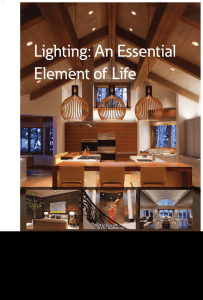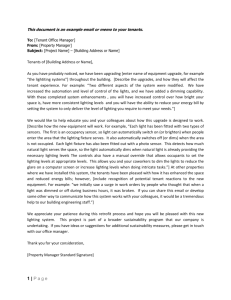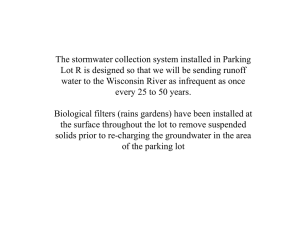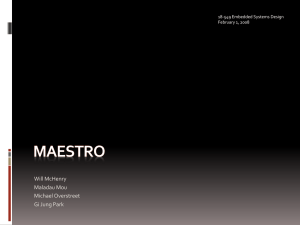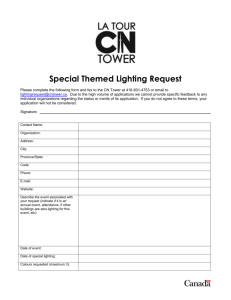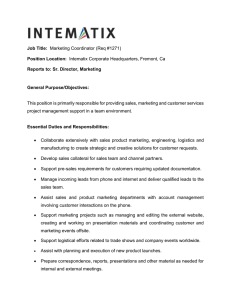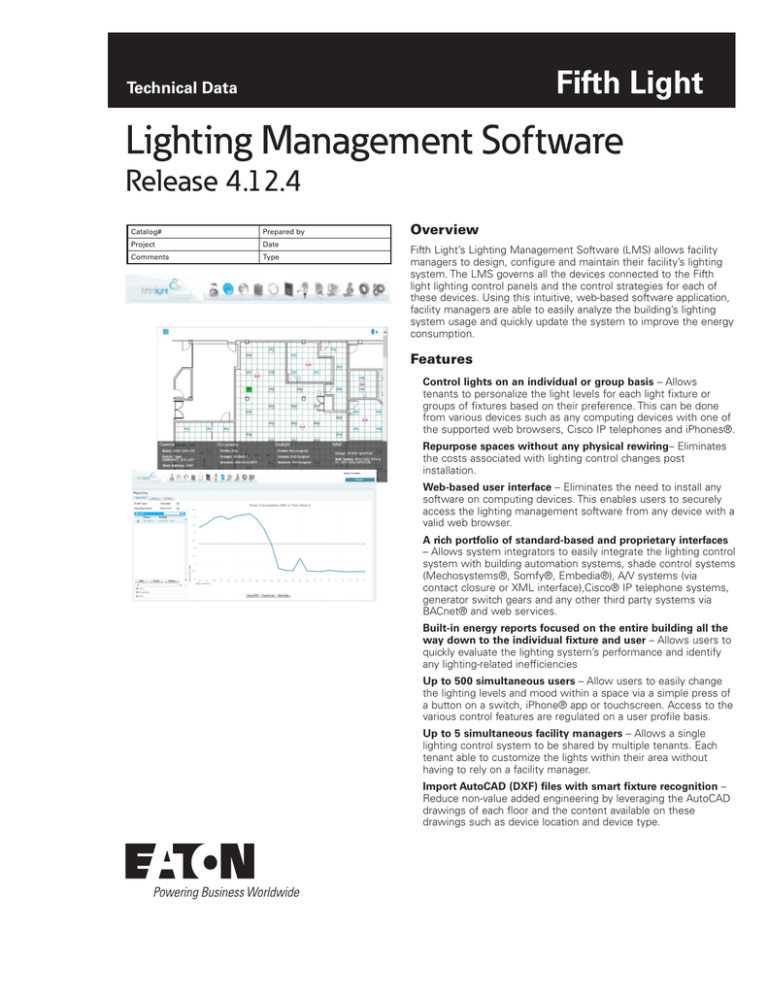
Technical Data
Lighting Management Software
Release 4.12.4
Catalog#
Prepared by
Project
Date
Comments
Type
Overview
Fifth Light’s Lighting Management Software (LMS) allows facility
managers to design, configure and maintain their facility’s lighting
system. The LMS governs all the devices connected to the Fifth
light lighting control panels and the control strategies for each of
these devices. Using this intuitive, web-based software application,
facility managers are able to easily analyze the building’s lighting
system usage and quickly update the system to improve the energy
consumption.
Features
Control lights on an individual or group basis – Allows
tenants to personalize the light levels for each light fixture or
groups of fixtures based on their preference. This can be done
from various devices such as any computing devices with one of
the supported web browsers, Cisco IP telephones and iPhones®.
Repurpose spaces without any physical rewiring– Eliminates
the costs associated with lighting control changes post
installation.
Web-based user interface – Eliminates the need to install any
software on computing devices. This enables users to securely
access the lighting management software from any device with a
valid web browser.
A rich portfolio of standard-based and proprietary interfaces
– Allows system integrators to easily integrate the lighting control
system with building automation systems, shade control systems
(Mechosystems®, Somfy®, Embedia®), A/V systems (via
contact closure or XML interface),Cisco® IP telephone systems,
generator switch gears and any other third party systems via
BACnet® and web services.
Built-in energy reports focused on the entire building all the
way down to the individual fixture and user – Allows users to
quickly evaluate the lighting system’s performance and identify
any lighting-related inefficiencies
Up to 500 simultaneous users – Allow users to easily change
the lighting levels and mood within a space via a simple press of
a button on a switch, iPhone® app or touchscreen. Access to the
various control features are regulated on a user profile basis.
Up to 5 simultaneous facility managers – Allows a single
lighting control system to be shared by multiple tenants. Each
tenant able to customize the lights within their area without
having to rely on a facility manager.
Import AutoCAD (DXF) files with smart fixture recognition –
Reduce non-value added engineering by leveraging the AutoCAD
drawings of each floor and the content available on these
drawings such as device location and device type.
Lighting Management Software Release 4.12.4
January 2016
Specifications
Supported Web
Browsers
Central
Manager/Local
Controller
Standard
Warranty
Internet Explorer 11+
Google® Chrome 40+
Safari 8+
Operating System: CentOS 6.5
Java Version: Java JDK 7 u 67
Application Server (only on Central Manager or
standalone local controller): JBoss 6.0
Screen Resolution: 1024 x 768 or higher
1 Year
Lighting Management Software
The LMS allows users to design, configure, commission and
manage their facility lighting control system through an intuitive
web-based user interface that can be securely accessed from any
computing device connected to the lighting control network. A
centralized management approach significantly simplifies day-to-day
operations resulting in a low cost-of-ownership.
The LMS assumes the roles of the system manager, system
gateway and security manager.
As a system manager, the LMS governs the lighting system and all
devices connected to the system. This includes DALI, low voltage
and ethernet based devices, i.e. 0-10V ballasts/drivers, DALI Field
Relays, DALI digital to analog converters, DALI dimming modules,
DALI and 0-10V occupancy and daylight sensors, DALI and 0-10V
wallstations, Fifth Light Touch Screens and other low voltage
devices. It also allows users to analyze the energy consumption
associated with their lighting system.
As a system gateway, the LMS handles the communication
between the Fifth Light System and third-party systems. It offers
a large list of standard-based and proprietary interfaces enabling
communication with Building Automation Systems, A/V systems,
Shade control systems, Cisco IP telephony systems and many other
third-party systems. These interfaces include: BACnet, XML (web
services), MechoNet RS-232 protocol, Somfy RS-485 protocol.
As a security system, the LMS authenticates the concurrent users
using user login to the system and ensures that they can only
access the areas and devices allocated to these users.
Web Based User Interface
The LMS web-based user interface allows users to access the
system from any computing devices with access to the Fifth Light
System. The user interface has been optimized to allow facility
managers to easily add devices, program the system and monitor
the system’s performance.
To simplify the browsing of hundreds of data points provided by
the system, the user interface has been carefully divided into three
sections: the toolbar, the filter panel and the floor plan/tabular panel:
The Toolbar is how users navigate between the key system
modules. The Filter Panel and Floor Plan is how users quickly
select multiple devices on the system. Each module has a
similar layout with the Floor Plan and Filter Panel being common
throughout most of the program. Using the Floor plan, users can
zoom into the floor plan to focus on a specific sub-area or device
within the facility. Users can hover above a device to get various
information with regards to the device (device type, schedule,
occupancy, etc). (See Fig 1).
Using a toolbar, users can access the various programming and
management modules. The toolbar is comprised of the following
main modules:
1. Personal Control – Individuals can control the light levels in
their workspace from their computer to suit their personal
preferences and create the ultimate work environment.
2. Scheduling – Using a calendar, users can schedule switching
or dimming of lights in areas where occupancy control is not
appropriate. Users can create multiple schedules that can be
employed for areas as small as a room or even an individual light
fixture.
3. Occupancy Detection – The user can define how lights and
plug loads respond to motion or lack of motion detection by
occupancy sensors. The system allows users to program lights
so that they dim gradually upon vacancy detection or blink
before shutting off as well as cutting power to non-critical plug
loads.
4. Daylight Harvesting – The user can associate lights with
daylight sensors in order to automatically adapt to ambient
natural sunlight to maintain a cost light level at desk height and
save energy.
5. Workpoints – Users can group lighting devices into workpoints
for ease of use. A workpoint is a set of light units with an
activation level for each unit.
6. Wall Mounted Controls – The user can define how lights
respond to a keypad or a switch, i.e. the light level or scene,
toggle action, hold action and many other options.
7. Monitoring – Facility managers can check, troubleshot and
diagnose the operational status of every light fixtures of the
lighting system. The monitoring utility can be set to run all the
time so that a problem is detected as soon as it happens.
8. Reporting – Facility Managers and tenants can view the
calculated measured energy, power consumption and savings
per device, area, floor, facility or campus. The reports can be
exported as pdf and excel files. (See Fig. 2)
9. Tenant Setup – The facility managers can setup different
tenants per system and give tenants control over their section
of the building or floor.
10.User Setup – User can create user accounts and assign access
privileges based on role and devices.
11.Commissioning – User can address a replaced device, upload
new programming changes to the local controllers and restart
them, if required.
12.System Setup – Facility Managers can create fixture types,
peripherals, end device and control devices and configure them.
2
www.eaton.com/lightingsystems
Lighting Management Software Release 4.12.4
January 2016
Figure 1.
Figure 2.
www.eaton.com/lightingsystems
3
Lighting Management Software Release 4.12.4
January 2016
Ordering
Catalog #
Description
FLT-LMS412
Lighting Management Software
Eaton
1000 Eaton Boulevard
Cleveland, OH 44122
United States
Eaton.com
Eaton
Lighting systems
203 Cooper Circle
Peachtree City, GA 30269
www.eaton.com/lightingsystems
© 2016 Eaton
All Rights Reserved
Printed in USA
Publication No. TD503069EN
January 20, 2016
Eaton is a registered trademark.
All other trademarks are property
of their respective owners.

